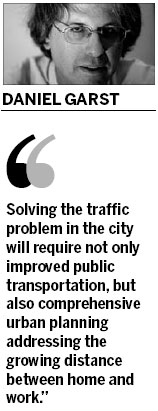
The latest studies done by Beijing-based Horizon Research Group paint a grim picture of the capital's weekday rush hour commute. Beijingers spent an average of 62.3 minutes every day in 2009 commuting in rush hour traffic, up 7.3 minutes from 2007 (without gridlocked traffic, the average commute would be about 40 minutes). This year Beijing had about five hours of daily congestion, compared with three and a half hours in 2008. Traffic jams cost residents an average of 335.6 yuan every year, more than any other large Chinese city.

The authorities' latest solution to the city's traffic congestion is to have many public servants and employees of State-owned companies start working at 9 am. This measure will probably just prolong the rush hour. It also inconveniences parents dropping their children off at school before 8 am. The same goes for people working for information technology companies and foreign companies, who have always begun work at 9 am.
The city has also extended its license plate number based driving restrictions for two years. The last digit of the number decides which workday of the week a car is not allowed on Beijing's roads. Although this measure has eased traffic somewhat, it is also unfair, because affluent two-car families can easily get around the one-day driving ban by alternating vehicles. And the fact that many motorists do just this has certainly limited the ban's impact in reducing road congestion.
Many city officials see Beijing's expanding subway system as a panacea for its traffic problems. But subway cars are already jam-packed during rush hour and cannot accommodate many more new passengers. And with subway trains already arriving at stations every two minutes during peak commuting times, it may not be possible to add any extra ones during rush hour.
Moreover, despite the subway system's recent expansion, many Beijingers still live and work some distance away from the nearest station. So even when roads are congested, going by subway, rather than driving, does save a little time but not much. And many people prefer spending an extra 10-15 minutes in the comfort of their automobile instead of being crammed like sardines into a subway car.
A Chinese friend I instant-messaged with a few evenings ago said precisely that when I asked her why she doesn't take the subway from her home near a Line 10 station to the Raffles Hotel where she works as a human resources manager.
Most people live closer to a bus stop than they do to a subway station. Unfortunately, buses here are also packed during rush hour. However it's easier to add more buses to bus routes than trains to subway lines at peak commuting times. But first measures must be taken to ensure that the extra buses don't simply further clog the roads. People will use buses, even if they can get a seat, if they provide a faster commute to work.
The obvious step would be to create bus-only lanes on most of Beijing's major streets. The prospect of a faster and equally comfortable commute might entice enough motorists to give up driving their private cars to work. And given the large numbers of bad drivers in the city, going by bus would also be safer (plus reduce crowding on the subway).
This measure must be combined with other moves to make driving less attractive. These should include further hikes in gasoline taxes, higher taxes on the purchases of second cars and congestion charges for using inner city roads.
The recent steep increase in parking fees in Central Beijing is another step in the right direction. The tripling of these charges has caused one friend who works for Ernest & Young at the New Oriental Plaza to take subway Line 5 to work, rather than commute by car (although my friend at Raffles still drives ).
Another key to addressing Beijing's traffic problems has nothing to do with improving the city's transportation system, according to a study by two Peking University professors, Lu Bin and Zhao Pengjun, and Gerald Linden, a Groningen University professor, published last year in an academic journal called International Planning Studies. They found that home-based job proximity, not public transportation, had the biggest impact on commuting times.
But skyrocketing housing prices mean more residents will buy housing in Beijing's outskirts, further away from their jobs. And all of my friends planning to do this tell me they will also buy a car.
So solving the traffic problem in the city will require not only improved public transportation, but also comprehensive urban planning addressing the growing distance between home and work. Unless this is done, we will all just have to get used to thinking of traffic jams as another Beijing specialty.